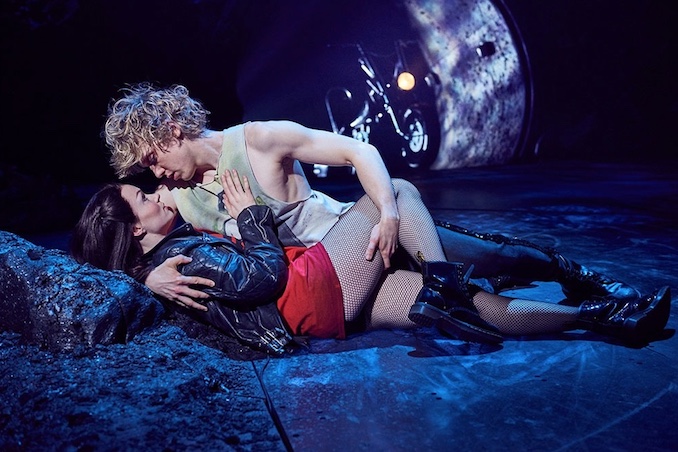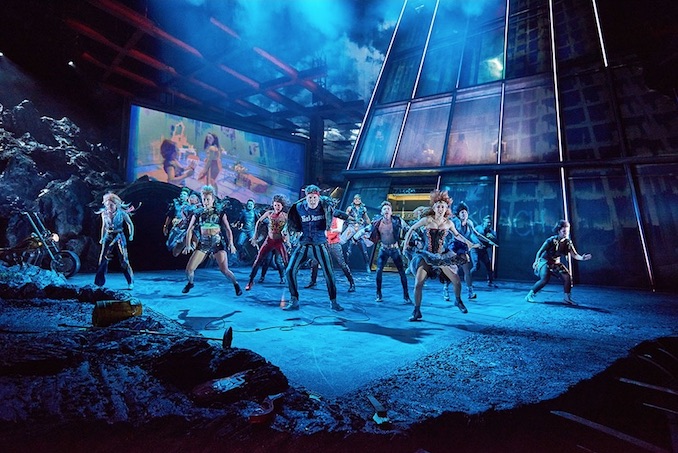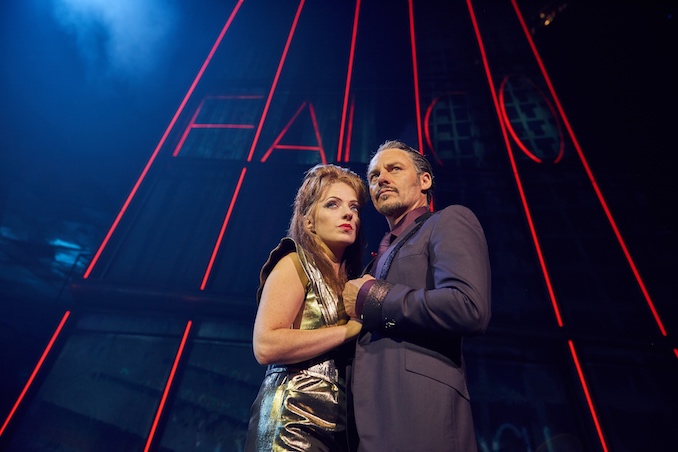Fans of Meat Loaf’s Bat Out Of Hell albums will be sure to feel nostalgic about many things when they hear his songs in this musical that is now ripping through Toronto at the Ed Mirvish Theatre. His albums, the first of which debuted 40 years go, have sold over 60 million copies worldwide. Songwriter and producer Jim Steinman wrote all the music and lyrics to the songs used in Bat Out Of Hell: The Musical. He also wrote and produced Bat Out of Hell and Bat Out of Hell II but did not produce Bat Out of Hell III despite having songs that he wrote on the album. Steinman is known as the “Father of the Power Ballad” also known for his work with Celine Dion. He also wrote music for films such as Footloose, Streets of Fire, and Mask of Zorro. But you may be surprised to learn that he actually began his career in theatre and this musical has been in the works for as long as the first Bat Out Of Hell album was released.

Die-hard fans of the album should know that the story lines woven into the musical really have nothing to do with Meat Loaf, the singer. Don’t expect the story of Meat Loaf or performers to take on his persona (yes, overheard whispers of questions near me “which one is Meat Loaf?”) but do expect an over-the-top theatre experience that will entertain you and trigger some emotions. Yes, you will feel the heart and soul of each performer and the set design is full of surprises. You’ll feel like you’ve inhaled a Red Bull when you leave. I couldn’t get to sleep until 2 am after seeing this.
We had the opportunity to chat with four of the lead characters in Bat Out Of Hell The Musical— Andrew Polec (Strat), Christina Bennington (Raven), Rob Fowler (Falco), and Sharon Sexton (Sloane), just days before their North American opening in Toronto.
So, tell us about your characters as most people don’t know what this show is all about.
Fowler: Well, it’s about a dysfunctional family. Falco is a very protective father. He probably wants to be part of the ‘Lost’ which is a community of kids who are stuck at the age of 18 forever. He, and his wife Sloane, got pregnant when she was 17 so they had to grow up. They also don’t want their daughter, Raven, who’s about to turn 18 to make the same life choices that they made when they were so young. They want to protect her but at the same time Falco and Sloane want to salvage their marriage.
Sexton: Sloane is a really conflicted character. To me she’s the heart of the piece. She’s got a lot of different loyalties. She wants Raven go out and live her life. She sees a lot of her younger self in Raven. But at the same time she wants to stand by Falco and try to keep the family together. She also has this affinity with the ‘Lost’ as well. When we started shaping the characters for this show, we thought of Sloane as being of the same age as the ‘Lost’ teens so she knows a lot of them and there were lots of friendships there but have disappeared over the years. The whole journey of this show has her wanting to support everyone else but ends up needing to find herself. You can think of it as a mid-life crisis. I think there are a lot of women in that kind of situation, you know, who have lost their identity either through marriage or having children.

Is it safe to say that many people coming to this musical wouldn’t expect this kind of story line?
Fowler: Right, a lot of people actually come expecting to see a ‘Romeo and Juliet’ story of teens falling in love and rock n’ roll. But what happens is our generation is the audience and they actually do have teens and going through so many changes in their lives. As parents, we get so protective of them and we can relate. You actually empathize with the villains in this story. One person wrote to us and told us that they’ve never seen a musical theatre piece where you empathize with the villain.
Sexton: Yes, we were originally painted as the villains but we’ve worked really hard with the directors and Jim. Through the music we try and give them souls so we’re not your cliche villains. We have these very emotional and gut-wrenching ballads that we get to sing so we have to get the audience on side.
Fowler: Also that typical family humour strife and arguments between teens and parents and between husband and wife that happens in every day life. Parents always think they are doing the best for their child and the kid just wants to be left alone, you know?
So, that bridges the gap of generations who come to see the show? Would most people assume this musical is for a baby boomer generation and die-hard rock and roll fans?
Fowler: The album came out 40 years ago. We’ve had these die-hard fans come and tell us they were brought to tears. Some of these songs mean so much to them not because of their childhood when they first experience this music, but also they can relate because of bringing a child into the world and how that can make marriage even harder.
Sexton: The generation that comes to see this show who bought the record have lived it. What’s wonderful about this show is you’ve got Strat and Raven in this first love and young love story for the younger generation. Their ballads are so pure and simple. For the older generation, we’re thinking ‘yeah, we’ve all gone through that,’ but then you’ve gone through real life as well so there’s something for everybody.

Fowler: The younger ones help you remember what it was like when you first fell in love. It puts you into a reality. We’ve opened the doors with Bat Out Of Hell to such a wide span of possible audiences.
Polec: It’s so funny seeing all the generations coming to see this show. We have people who are teens and then people who are in their 30s right through to the 70s. We’ve seen a grandmother, mother and daughter come together because they can all relate to the story in some way. A young girl once came up to me and told me that she played Bat Out Of Hell at her grandfather’s funeral. So, I think this has connected with so many people at different stages in their lives. It’s a timeless classic.
Bennington: I think for the younger generation it’s very relatable as they discover it for their first time. We’ve rediscovered the genius of this music for the next generation and making it our own. I think this music is so uplifting, joyful and full of emotion. Everyone will experience it in their own way. I mean, everyone should come to show because we’ve got fire, motorbikes, an amazing set, and really great choreography! I think there’s no other theatrical experience out there quite like this.
Are there expectations to keep this a high-energy show? How do you stay focused and maintain that level of performance?
Fowler: Yes, there is a lot of pressure especially vocally because they’re all in the original keys they were written in. Giving the same level of vocal ability at each performance is what Meat Loaf did and he probably toured for a couple of months here and there but eight shows a week is different. We’re sharing the songs between a cast with nine feature principals in this show so we need to share the weight of the songs to carry that volume and sound together. It’s a lot of pressure for every single individual on stage every night.
Sexton: We’ve been doing this show since January. I don’t mind saying that often when you do a show for a long time, there are parts of a show that you can switch off a part of your brain but with this show that just doesn’t happen because it’s just too intense. It moves so fast but the energy from the audience and the music makes it very easy to give our everything every night.
Fowler: The only way to save your vocal cords and to stay healthy is to commit because if you don’t give 150% of yourself you’re going to feel the pain. It’s full on.
Sexton: Yes, you’ve got to rip it out and throw it on the floor every night!
Bennington: The show is physically and vocally demanding. It’s definitely a marathon in both senses. Vocally you need to know what to do and how to train to sustain yourself for the whole week. We got some tips from Meat Loaf which was pretty cool.
Oooh, so what advice did Meat Loaf have for you?
Polec: Oh, geez! He’s such a sweet guy! He’s very humble and modest. He says ‘don’t call me a legend or a superstar, I’m just a regular guy.’ But all I’m thinking is he’s my idol. He’s the kind of guy that gets in very closely and then tells you that you need to become these songs. You need to completely own them and totally put yourself in and only then can you give them to the audience as a gift. He is totally into the idea that you need to go into this life or death situation that Jim Steinman has written in this melodrama. If you’re fully invested to it. You just have to give your full body and soul to it.
Bennington: Absolutely, people come to see the show and they say it looks so tiring and ask us how we do it? In a way, how can you NOT do it? I feel like if you fully throw yourself into it, there’s no other option. You can never give this less than all you’ve got. You get this adrenaline rush every night. It’s always exciting and you always get a buzz after the show. It’s always difficult to sleep.
Did they have to make any changes to any of the songs for the musical?
Sexton: We’ve made a couple of the songs duets which hasn’t been done. ‘For Crying Out Loud’ was never meant to be a duet.
Fowler: Iconic songs like ‘Paradise by the Dashboard Light’ is exactly the same in length as the original. Same as ‘Bat Out Of Hell’. Jim Steinman was very clear that he didn’t want to cut any of the lyrics out or change the songs. It’s sacrilegious. You cannot even take one verse out.
Wow! And those iconic songs are like 10 minutes long too! So they’re like mini-performances within a larger production?
Fowler: Yes!
So, what would you do for love? Would you do anything?
Polec: I think I’d do almost anything for love. But it’s not like I’d donate my heart to someone else for love but then again, I think that IS love. I guess? I’ll just hold my tongue on this one.
Bennington: I’d do anything for love! I think that’s what this show is all about. It’s about what it means to be loved and how everyone just wants to be loved. Also the different types of love. In a way, this show brings joy and hopefully people ask themselves what would they do for love.
Fowler: What wouldn’t you do for love?
Sexton: I wouldn’t jump into an 8 foot pond of cold water! I won’t do that!
Fowler: (laughs) You know, I don’t think I would give up being an actor for love because it’s part of who I am. If you sacrifice that side of you for someone else, it’s like losing a family member for me.
And what’s on your Toronto Bucket List?
Polec: Oh, so many people have given us suggestions on what to do here. Someone told us we should try Axe throwing? Is that a thing here?
Bennington: Oh, I want to see Casa Loma and The Shoe Museum. The people are amazing and friendly, so we’ll try and see as much as possible.We love this city.
Bat Out Of Hell The Musical is now on stage at the Ed Mirvish Theatre extended until January 7, 2018. For more information visit mirvish.com
Update: Back by popular demand October 16 to November 3, 2018




